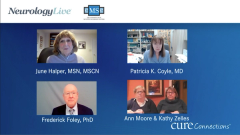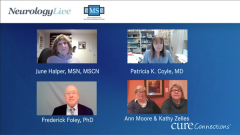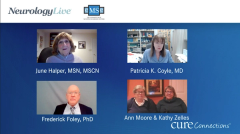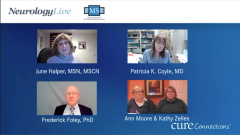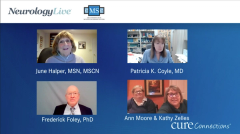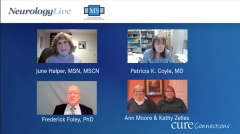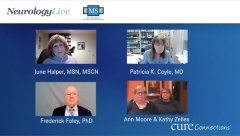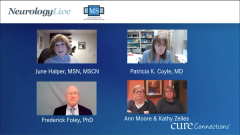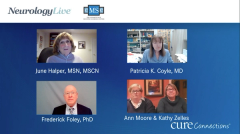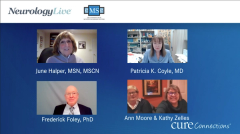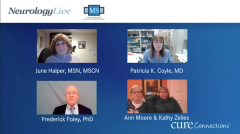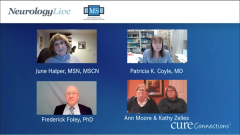
Patient Support Networks for Multiple Sclerosis

Episodes in this series

The support of family and friends offers strength to patients with multiple sclerosis.
June Halper, MSN, MSCN: Speaking about struggle and the things that we need to keep us going, we all need support networks. Obviously, you and Kathy, Ann, have a very strong relationship and you’ve been through quite a bit together for a very long time, and nothing seems to have broken you apart except maybe a dog barking like in my house. There’s a term that Fred taught me a long time ago about people who bounce well with MS [multiple sclerosis]. I think he defined it as resiliency. In fact, there’s a lot of nursing research going on about the characteristic of resiliency because right now a lot of nurses are going through very difficult times with the COVID [coronavirus disease 2019] and the things that we’re facing. It seems to me that how you have developed this characteristic or did you always have it? Were you always flexible? I just need to know a little bit more about what made you bounce or bounce nicely, yeah.
Ann Moore: There are times where I can be very flexible and then there are times where I can dig my heels in. I’ve had to learn resilience. I’ve had to learn patience with myself. I have the patience of a saint with anybody else in my life but with myself I have no patience at all. As Dr. Coyle and you were just saying about the fatigue, they’ve tried me on Nuvigil and Provigil years ago and the heart palpitations, I thought my heart was going to pop out of my chest. I haven’t been on anything. So I’m willing to, if they’re coming out with some new drugs, I’m willing to give it a shot because right now that’s one of the biggest parts of the exacerbation that I’m having is I get up, I take a shower, and I’m ready to take a nap. I think the quality of my life right now is not, I don’t think, I know it’s not where I’d like it to be and it’s very hard for me to accept it.
June Halper, MSN, MSCN: I bet. Kathy, how have you handled this, the ups and downs? You’ve been a stalwart partner. I know you’ve had your other ups and downs of your own personal nature. What’s helped the two of you to come through this so successfully? And I do think you’re a successful partnership, from my perspective.
Ann Moore: Almost 34 years.
Kathy Zelles: Both of our families are actually really supportive. My parents are both in the medical field and still alive, so we often will chit-chat with them and perspective is always a good thing. We have a huge network of friends that almost know what we need before we know. So, if we’re really struggling, there’s always somebody that will fill in the blank. Like I’m still working but Ann’s has not been, and the fatigue is what really, between that and the brain fog, she couldn’t do what she was doing. So that was a huge adjustment. The fatigue is the most frustrating part because you can’t consistently plan a schedule.
June Halper, MSN, MSCN: Yeah, that must be frustrating.
Kathy Zelles: That’s the hardest part for me because I’m a very structured person, and if you’re supposed to do this at 9 o’clock this morning then what are you doing? Your support system, my professional background, I can go back and read things and go, okay, like you have to give her the benefit of the doubt, you have to give her the support. You have to know when to back away a little bit and get your perspective back and make appropriate suggestions.
June Halper, MSN, MSCN: What advice would you give other care partners? Certainly, one of the things I saw when I was in practice, and I was in practice for 25 years, is the high rate of divorce and people separating. You probably have been probably at the far end of relationships that stayed together.
Kathy Zelles: Yeah.
June Halper, MSN, MSCN: And Dr. Foley knows what I’m talking about.
Ann Moore: That was my biggest fear that Kathy was going to leave me and not until too long ago I still had that fear. It’s due to the help of Fred and through dealing with Kathy and talking to her that I realized that she loves me unconditionally and she’s not going anywhere. But it wasn’t always like that. It was a big, huge fear of mind because that’s what I saw in Glen Rock where I grew up.
June Halper, MSN, MSCN: I know there were a lot of those patients. What convinced you that she was going to stay? What gave you the security knowing that you had a strong relationship?
Ann Moore: Talking to Dr. Foley and letting Kathy know. I’m more of a talker than Kathy, so I can beat a dead horse sometimes. I have learned to not beat the dead horse and tell Kathy, “This is what I can use from you. Maybe you can see it this way. Could you view it another way,” because she knows I’m not a slacker.
Kathy Zelles: No, she’s not.
Ann Moore: And if I don’t do something, there’s a good reason for it. Because we have communicated and a lot more recently in the last many years, I think it’s helped us to stay together.
June Halper, MSN, MSCN: What advice? I’m sorry, go ahead.
Kathy Zelles: She’s a very proactive person as far as her medical care goes, so she’ll reach out. She went for a stint at Kessler for cognitive.
Ann Moore: Rehab.
Kathy Zelles: Rehab which was really helpful because it gave her a lot of tools, and I didn’t have to be the one to tell her. We use the outside, even though I can support it, I don’t feel like I have to do it.
Ann Moore: It’s like teaching your spouse how to play tennis. You don’t want to do it. You’ll never be married at the end of it, so don’t do that with us.
June Halper, MSN, MSCN: I don’t want to play tennis either.
Ann Moore: Exactly.
June Halper, MSN, MSCN: I want to thank you all for watching and joining us at this NeurologyLive® Cure Connections®. If you enjoyed this program, please subscribe to the e-newsletter to receive upcoming information about other programs. I’d like to thank you all for the time and I thank you all for this wonderful opportunity and hope to see you all again.
Newsletter
Keep your finger on the pulse of neurology—subscribe to NeurologyLive for expert interviews, new data, and breakthrough treatment updates.

